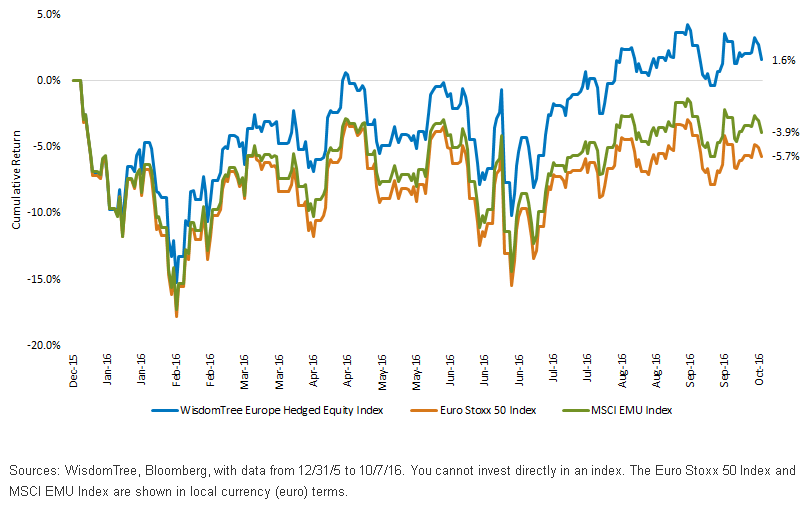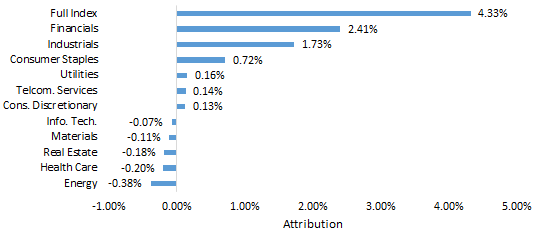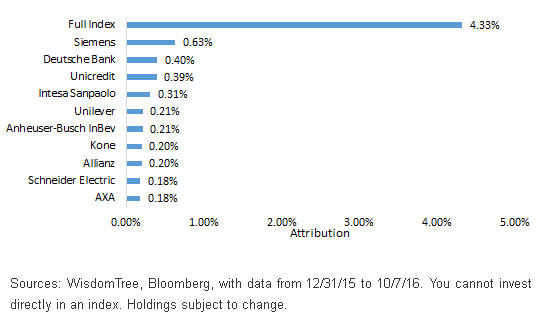European Exporters Have Delivered Significant Outperformance in 2016


Whether the reason is slow economic growth, a perception the European Central Bank (ECB) is engaging in ineffective policy, negative interest rates weighing on banks or the surprising Brexit result and fear of political spillover, one thing is clear: investors haven’t been very positive about European equities in 2016.
Why Look at European Equities?
We wrote recently about the earnings growth and the valuation of European equities 1 broadly. While we all know that U.S. equities2 have had an incredible run, the fact is that U.S. market valuations have been expanding.
If one believes, as we do, that earnings of a select portion of European companies have the potential to grow faster than companies in the U.S and that the current entry point represents a lower valuation point than the U.S., a case can be made that these stocks are relatively attractive.
European Exporters’ Performance Significantly Diverges from Other Benchmarks

For definitions of indexes in the chart, visit our glossary.
We also wrote about how the WisdomTree Europe Hedged Equity Index—by virtue of including companies that receive at least 50% of their revenues from outside of Europe—is well- positioned in sectors exhibiting stronger earnings growth. Illustrating the connection between stronger earnings and performance, during a year when the MSCI EMU Index is down 3.9% and the Euro Stoxx 50 Index is down 5.7%, the WisdomTree Europe Hedged Equity Index is up 1.6%.3
It’s also worth noting that many have been pleasantly surprised that markets have recovered from the lows they hit a few days after the surprise Brexit result. Since that point, the WisdomTree Europe Hedged Equity Index is up more than 13%, also outperforming these other benchmarks (MSCI EMU Index: up 12.3%; Euro Stoxx 50 Index: up 11.6%).
In Today’s Markets, Surprising Positives
In an uncertain European environment where it seems everyone is waiting for the proverbial next shoe to drop, we thought it would be useful to describe the exposures derived from tilting an index toward European exporters that are leading to outperformance in 2016.
What an Export Tilt Looks Like by Sector and Company
WT Europe Hedged Equity Index vs. MSCI EMU Index: Sector Attribution
(December 31, 2015, to October 7, 2016)

WT Europe Hedged Equity Index vs. MSCI EMU Index
Attribution and Top 10 Positive Company Contributors (December 31, 2015, to October 7, 2016)

Click for current holdings of the WisdomTree Europe Hedged Equity Index.
• Financials: The Financials sector was the biggest contributor to outperformance in 2016, shown by comparing the WisdomTree Europe Hedged Equity Index and the MSCI EMU Index. Avoidance and under-weights to Financials explain why WisdomTree has outperformed MSCI: Deutsche Bank, currently much maligned in the media, does not qualify as an exporter. Unicredit, Intesa Sanpaolo—these are also not exporters. In Europe at present, Financials are under stress, but for the most part companies in this sector do most of their business domestically, thereby not qualifying for the WisdomTree Hedged Equity Index.
• Industrials: The predominant story here is stock selection, with Industrials within the WisdomTree Europe Hedged Equity Index delivering a 12% return when those within the MSCI EMU Index delivered only 5.22%. Siemens, a major over-weight within the WisdomTree Index, is up more than 21% year-to-date. Kone is another company doing particularly well, up more than 18% for the year. These global manufacturing companies have become more competitive because of weakness in the euro over recent years, and the more positive tone from emerging markets also is contributing to these companies’ strength this year.
• Consumer Staples: Over time, these global consumer brands have tended to be one of the largest over-weight sectors when tilting toward exporters, and relative to the market this year they are holding up well. This year, the 8.5% average over-weight makes it the third biggest sector contributor to the outperformance of the WisdomTree Europe Hedged Equity Index.
• Different strategies are designed for different market environments, so we note that if one believes that European real estate will benefit from the
How to Think about European Equities Today
For most of 2016, many investors have been concerned or unsure about Europe. They want to know how Brexit will pan out or if Deutsche Bank can withstand whatever payment is levied by the U.S. Department of Justice. These uncertainties create opportunity, in our view.
At the core of the matter, European exporters have been delivering profits, and in many cases, those profits have been growing. Now is the time to think about moving some profits from U.S. equity allocations toward a market that could be an outperformer tomorrow.
Unless otherwise noted, data source is Bloomberg and period is from December 31, 2015, to October 7, 2016.
1European equities: Refers to the MSCI EMU Index universe.
2U.S. equities: Refers to the S&P 500 Index universe.
3Source: Bloomberg, with data from 6/27/16 to 10/7/16.
Important Risks Related to this Article
Investments focused in Europe increase the impact of events and developments associated with the region, which can adversely affect performance.Hedging can help returns when a foreign currency depreciates against the U.S. dollar, but it can hurt when the foreign currency appreciates against the U.S. dollar.

Christopher Gannatti began at WisdomTree as a Research Analyst in December 2010, working directly with Jeremy Schwartz, CFA®, Director of Research. In January of 2014, he was promoted to Associate Director of Research where he was responsible to lead different groups of analysts and strategists within the broader Research team at WisdomTree. In February of 2018, Christopher was promoted to Head of Research, Europe, where he was based out of WisdomTree’s London office and was responsible for the full WisdomTree research effort within the European market, as well as supporting the UCITs platform globally. In November 2021, Christopher was promoted to Global Head of Research, now responsible for numerous communications on investment strategy globally, particularly in the thematic equity space. Christopher came to WisdomTree from Lord Abbett, where he worked for four and a half years as a Regional Consultant. He received his MBA in Quantitative Finance, Accounting, and Economics from NYU’s Stern School of Business in 2010, and he received his bachelor’s degree from Colgate University in Economics in 2006. Christopher is a holder of the Chartered Financial Analyst Designation.

